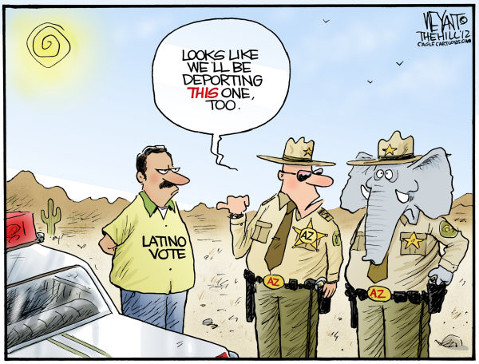Mass Deportation Targets Black and Latino Men

President Obama recently announced his plans to revise the administration’s deportation priorities. His plans include deferring deportation and offering work authorization for up to five million immigrants. This announcement appears to have increased Obama’s approval ratings among Latino voters.
The Republicans are up in arms with regard to Obama’s proposed changes and have vowed to block his efforts to change course on deportations.
Amid this debate over how many people should be deported and where deportation priorities should focus, a key point has been lost: nearly all deportees are black and Latino men. The racial and gender disparities in immigration law enforcement reflect deeper issues in this country.
Over two million people have been deported during President Obama’s administration — more in six years than the sum total of all deportations prior to 1997. Moreover, about 90 percent of deportees have been men, and nearly all (97percent) are from the Americas, even though about half of all noncitizens are women and only 60 percent of noncitizens are from the Americas.
Black and Latino men have been targeted for deportation because of the way immigration laws are enforced. We can imagine ways that immigration laws could be enforced that would have targeted women or Asian immigrants — there could have been raids on hotels, informal markets, or Chinatown restaurants. However, this did not happen. Instead, immigration law enforcement has collaborated with criminal law enforcement — which has led to gender and racial disparities in deportations.
Deportations began to rise in 1997, after the laws governing deportations were changed. They increased again with the creation of the Department of Homeland Security in 2003. The rise in deportations during the 1990s occurred during a moment of economic stability, but also in the context of fear of crime, tied to racial stereotypes, and a massive prison buildup. The more recent increase also occurred in a context of fear — this time of terrorism and economic insecurity.
The Great Recession (2007-2009) created turmoil in the U.S. economy. It also created fear as people lost their homes, their life savings, and their jobs. The recession also hit the wealthy, yet they have recovered. They were able to do so without making any real concessions to working class or poor people. Real wages have remained stagnant or dropped, pension funds have been cut, and unions have lost most of their clout. Instead of appeasing workers by throwing them a few crumbs, the fear created by mass incarceration and mass deportation seems to have succeeded in keeping the masses compliant. The recent uprisings surrounding police brutality are an important exception insofar as people are fighting back against state-sponsored repression.
The racialized and gendered nature of immigration law enforcement — specifically the targeting of black and Latino men — should be unsurprising to anyone familiar with the history of state repression in the United States. The enslavement of African Americans, the internment of the Japanese, and the mass deportation of Mexicans in the 1930s were all official state practices that targeted specific ethnic or racial groups.
In today’s political climate of colorblind racism, it is unacceptable to have a policy that explicitly targets one group. However, it is legal and acceptable to have a policy that — in its implementation — produces disparate outcomes. For this reason, it has been next to impossible to raise legal challenges to the racial and gender-based discrimination African-American men face in the enforcement of criminal law. Similarly, insofar as deportation laws are colorblind in their language, it is legally permissible that they are discriminatory in practice.
Over five million people have been deported from the United States since 1997. This period is exceptional insofar as there has never previously been a time when so many people were deported from the United States. There are some signs that the era of mass deportation may soon come to an end.
I welcome President Obama’s executive actions, which could spell the end of mass deportation, which has broken up families and uprooted long-time community members. Nevertheless, it is crucial to understand that mass deportation would not have been possible were it not for the racialized and gendered fears people in the United States have with regard to immigrants.
Mass deportation is best understood as an instance of racialized and gendered state repression directed towards a minority group during an economic crisis. In this sense, it bears resemblance to the intensification of criminal law enforcement directed at African Americans in the aftermath of deindustrialization. Mass deportation is an example of state repression, and this intense form of repression is more acceptable to the public insofar as it is directed at racially subordinated groups.
Thus, even if mass deportation comes to an end, the racial and gender ideologies that permitted it to happen will persist.
Tanya Golash-Boza is an associate professor of Sociology at the University of California, Merced. She is the author of Deported: Immigrant Policing, Disposable Labor and Global Capitalism, forthcoming in November from New York University Press. Prof. Golash-Boza speaks at UCSB’s MultiCultural Center’s “Race Matters” series on Tuesday, January 27, at 6 p.m., in the MCC Lounge.



